אתר זה משתמש בקובצי Cookies כדי להבטיח שתקבל את החוויה הטובה ביותר באתר שלנו. קראו את מדיניות הפרטיות ותנאי השימוש.
קיימים מספר ערוצי קבלה.
בכל אחד מערוצים אלו, יש לעמוד בנוסף ביתר תנאי הקבלה. פירוט נוסף ניתן למצוא בקטגוריית מועמדים וכן במדריך לנרשם.
חישוב ממוצע הבגרות כולל בונוס עם ציון מבחן הפסיכומטרי או התיל.
ציון ההתאמה הקובע לקבלה למרכז האקדמי לב הוא 79 לקבלה על תנאי או 80 ומעלה לקבלה תקינה.
למחשבון ציון ההתאמה לחץ כאן
הלימודים מתחילים בסמסטר אלול. במהלך הסמסטר לומדים, בנוסף ללימודי קודש, גם את קורסי הקדם במתמטיקה, מחשבים ופיזיקה (משתנה מחוג לחוג). הסמסטר אורך כחודש ומטרתו לסייע לסטודנטים לחזק ולרענן את הידע בתחומים אלו לקראת הקורסים המתקדמים של סמסטר א'. לכל תלמיד חדש מפורט במכתב הקבלה אילו קורסים הוא מחויב ללמוד בסמסטר אלול.
שכר הלימוד במרכז האקדמי לב הוא שכר לימוד אוניברסיטאי מופחת ונקבע כל שנה על פי החלטת המועצה להשכלה גבוהה.
שכר הלימוד אינו כולל תשלומים עבור לימודי קודש, קורסי יסוד באנגלית, קורסי קדם ואגרות.
מבחן פוטנציאל שבודק כישורים ותכונות רלוונטיים ללימודים האקדמיים. מבחן זה מוכר כמקביל למבחן הפסיכומטרי עבור קבלה למרכז האקדמי לב, למעט למועמדי העתודה האקדמית ומועמדים לחוג לסיעוד.
המבדקים נמשכים כ-4 שעות ומתייחסים למידת ההתאמה לחוג המבוקש. המבדקים מוצגים באמצעות צג המחשב ואין כל צורך בהתנסות קודמת בהפעלת מחשב על מנת להצליח בהם. מבחן להתנסות עצמית ניתן למצוא באתר תיל אינטרנשיונל. לפרטים נוספים על המבחן ושאלות לדוגמא- לחץ כאן
בקשה לשינוי רישום יש לשלוח במייל למדור רישום. יש לציין בפניה שם מלא ומספר זהות.
מדור רישום לב harshama@jct.ac.il
מדור רישום טל harshama-tal@jct.ac.il
מדור רישום לוסטיג oritmu@jct.ac.il
מדור רישום תבונה tvuna@jct.ac.il
ניתן לבצע שינוי כל עוד החוג פתוח להרשמה. השינוי חייב להתבצע ע"י פניה במייל למדור מידע ורישום.
במידה והנך עומד בכל תנאי הקבלה, מכתב הקבלה יישלח במייל בתוך שבוע ממועד קיום הריאיון.

|
1999-2002 |
First degree in Life science. Hebrew University of Jerusalem. Graduated with honors. |
|
2002-2005 |
Master degree in biological chemistry. Hebrew University of Jerusalem. Thesis: Activating PKR for selective kill of CML (chronic myeloid leukemia) cells. By supervision of Prof. Alexander Levitzki. |
|
2005-2012 |
PhD degree in genetics. Hebrew University of Jerusalem. Thesis: Search for a new APC’s (Anaphase promoting complex) substrates in yeast. By supervision of Prof. Michael Brandies. |
|
2002-2004 |
Teaching assistant in course Biochemistry for chemistry 2nd and 3rd year students, Hebrew University of Jerusalem (HUJI). |
|
2007-2011 |
Teaching assistant in course General Genetics for biology students 1st year. HUJI. Distinguished teacher in 2009. |
|
2011-2012 |
Teaching assistant at Hadassah college in courses: General Genetics, 1st year; Cell Biology 1st year; Molecular biology 2nd year |
|
2012-2014 |
Teaching assistant at Hadassah college in Biochemistry course 2nd year. |
|
2012-2017 |
Teaching assistant at Jerusalem College of Technology (JCT) in Anatomy & Physiology course 1st year. |
|
2014-2018 |
Lecturer in Open University in Medical science course for Medical Secretaries diploma students. |
|
2017-Now |
Lecturer at JCT in Immunology, Microbiology, and Physiology courses for Bioinformatics students. |
|
2017-2019 |
Lecturer at Nahardea (Ofek) in Immunology and Advanced diagnostic methods courses to Nursery students. |
|
2019-Now |
Lecturer at JCT in Advanced Microbiology, Human Anatomy and Histology courses for Bioinformatics students. |
|
2013-Now |
Lab manager of Prof. E. Sherman laboratory, Biophysics, Hebrew University of Jerusalem. Managing all relevant technical aspects of laboratory; Training student; Independent project of my own. |
|
2002 |
First degree graduated with honors. |
|
2009 |
Distinguished teacher in course General Genetics, HUJI |
Prof. Eilon Sherman lab, Rocah Institute of Physics, HUJI
In our lab we apply methods of single molecule localization microscopy (SMLM). We aim to research immune system cells, especially T lymphocytes and their interaction with target cells. T cells have a significant role in the mechanism of the acquired immune system: CD4+ T cells act as helpers, activating other cells in the immune reaction; CD8+ T cells are cytotoxic, which kill infected cells. We are intriguing to investigate specific proteins involved in the cell-to-cell recognition complex and following T cell activation pathway.
Our methods allow us to visualize immunological synapse in super-resolution level, as single proteins. We use photo-activatble protein tags for PALM (photo-activated localization microscopy) for imaging processes in live cells and their dynamics. We also use synthetic fluorophores for STORM (direct stochastic optical reconstruction) in multiple colors for immune-fluorescence of live and fixated cells.
Special photo-activatble fluorophores in combination with statistical and image processing methods allows us to study signaling complexes in single molecule detail in intact (fixed and live) cells with resolution down to ~20nm. We can estimate the clustering of different proteins; it’s dynamics on T cell membrane prior and after cell activation; recruitment and timing of intracellular cascade.
Current research
Using SMLM and PALM methods we investigate activation of artificial CAR receptors expressed on CD8+ lymphocytes. This project is with collaboration with Ihilov hospital, Tel-Aviv. Researchers in Ihilov and Tel-Aviv University developed CARs that targets special sugars common on some cancer cells and leading to selective T cell activation against this cancer. Expression of those CAR receptors on patient lymphocyte leads to patient specific therapy. We are involved in this project, studying the activation pathway of T cells by CAR after the meeting with cancer cells. Also we look for better structure of this CAR and how improve their action against cancer cells.
Y Razvag, Y Neve-Oz, J Sajman, M Reches, E Sherman, Nanoscale kinetic segregation of TCR and CD45 in engaged microvilli facilitates early
Conferences:
|
1998-1999 Mar 2020-Sep 2020 |
National service Yad-Sarah organization. Coronavirus test: virus inactivation at Virology department Hadassah Ein Karem hospital |
